
 We need to implement a strict phone policy at Millikan, now! It is clear that cell phones prove to be the greatest distraction to all students and greatly reduces the attention span of kids in school.
We need to implement a strict phone policy at Millikan, now! It is clear that cell phones prove to be the greatest distraction to all students and greatly reduces the attention span of kids in school.
If you were to walk into any classroom on the Millikan campus, you would likely see at least a quarter of the classroom not paying attention, scrolling through their phones, missing out on the lesson being taught. This is not only horrible for students as they are missing out on class curriculum, but also further reducing their attention spans.


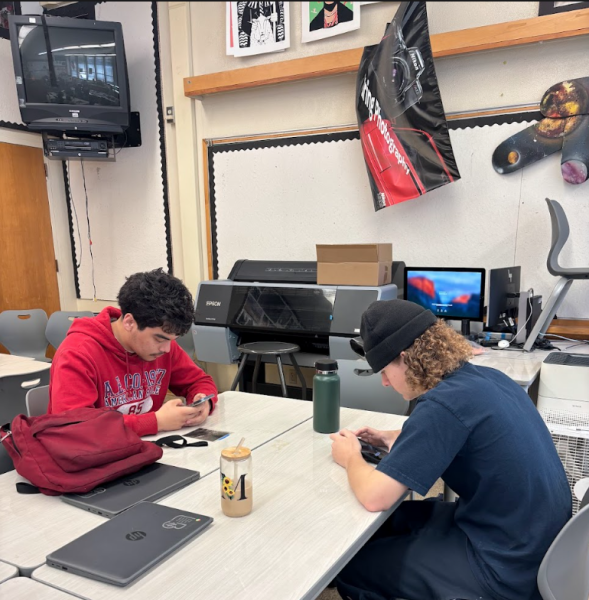
Without further district intervention regarding the use of phones in the classroom, this constant distraction is sure to remain. Should the Long Beach Unified School District implement a more strict policy that is required to be followed in all classrooms, the distraction of phones will be reduced in a major way.
Teachers also noticed a major increase in classroom phone use after the COVID 19 Pandemic.
“People are just glued to their phones, constantly looking down at them all class. I’ve seen more phone use than I’ve seen in my life,” said physics teacher Mr. Lopez.
During the lockdown period of COVID, there was no regulation on phone use as all work was completed from home. Phone addictions only worsened from there and the loose restrictions in place now only promote this phone-addicted lifestyle.
What exactly this phone policy needs to look like is up to the school district, but a strict implementation of it is clearly needed to ensure students are able to effectively learn in class.





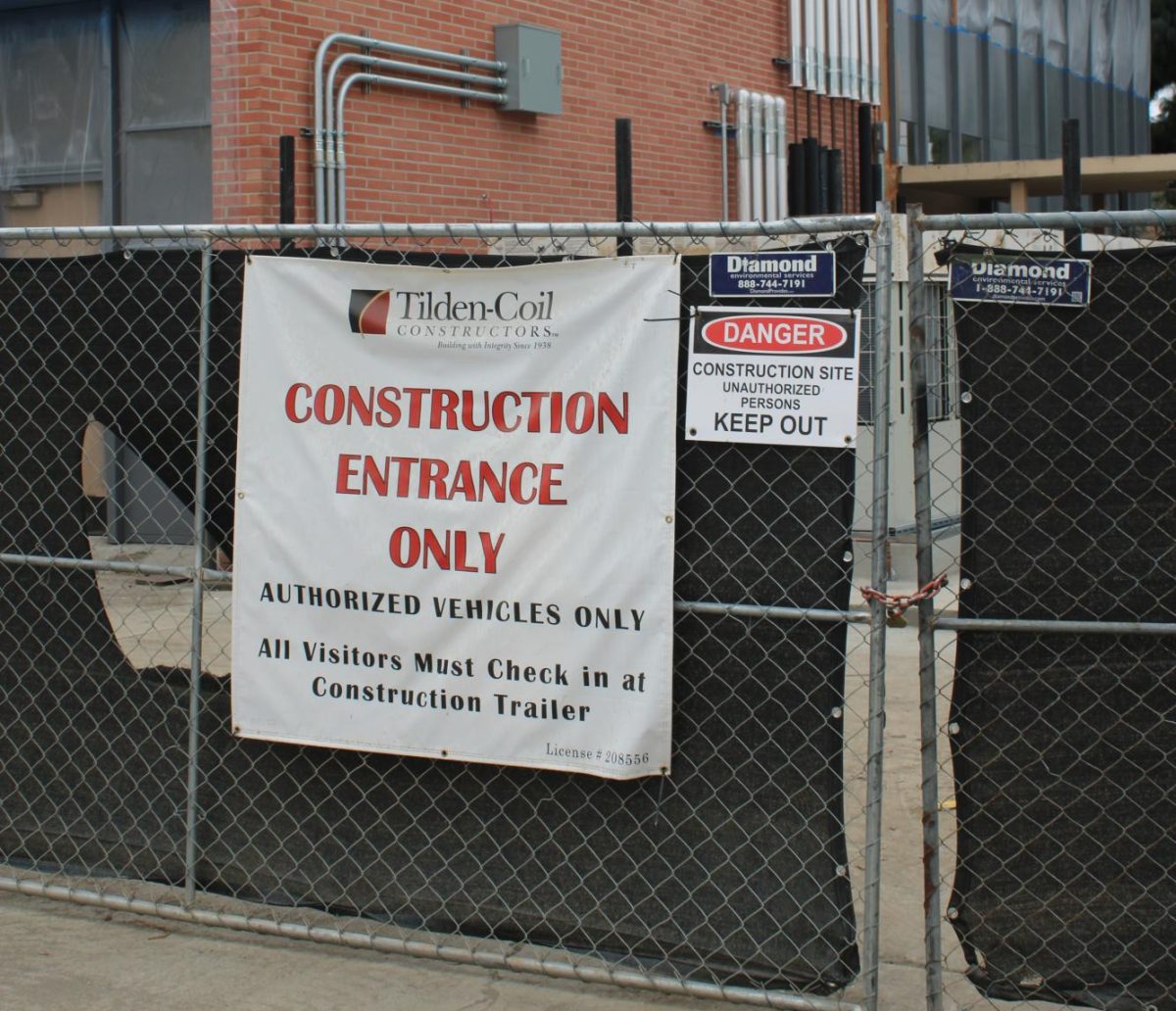


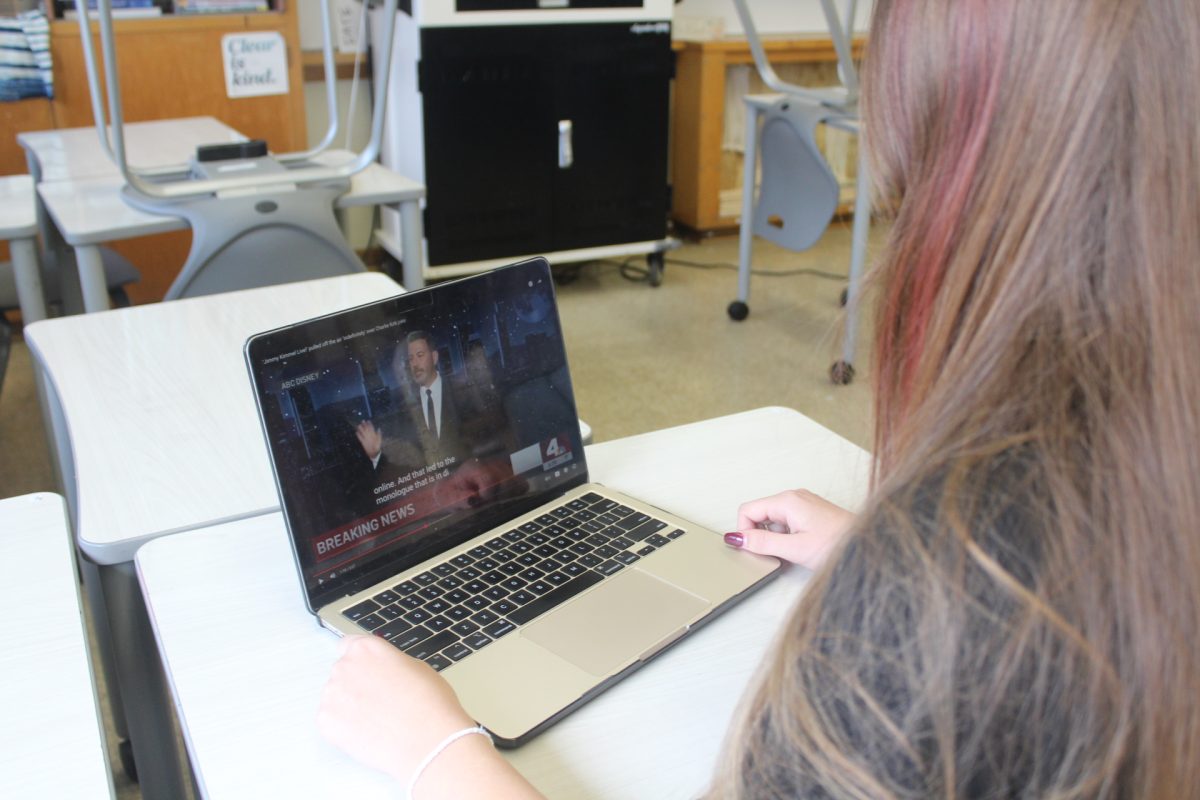











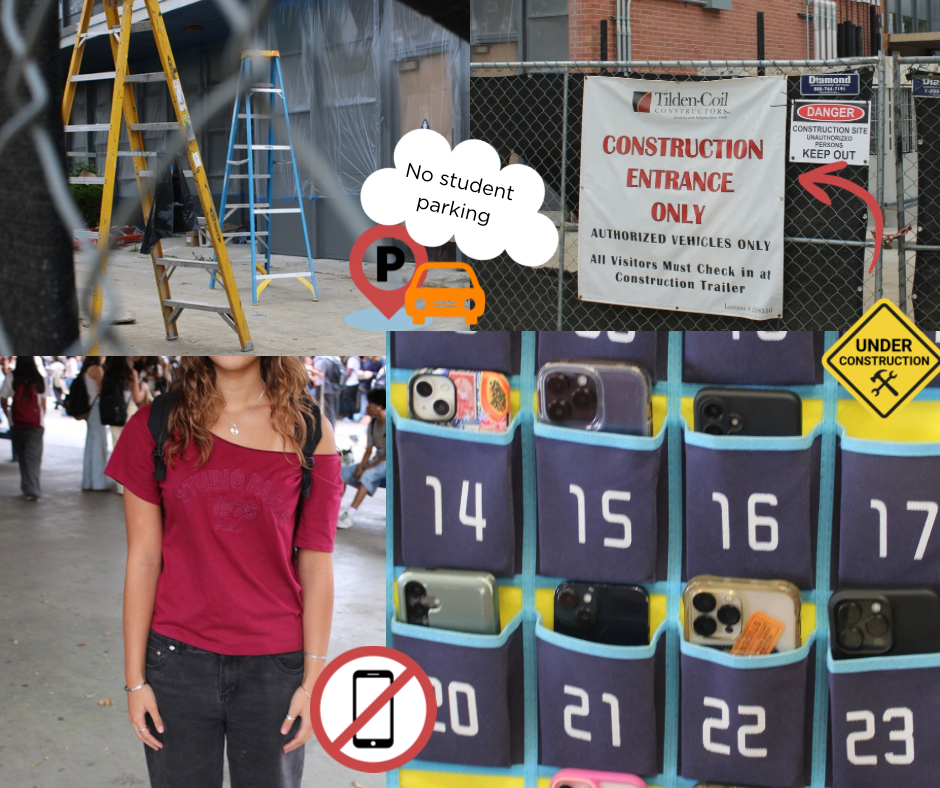




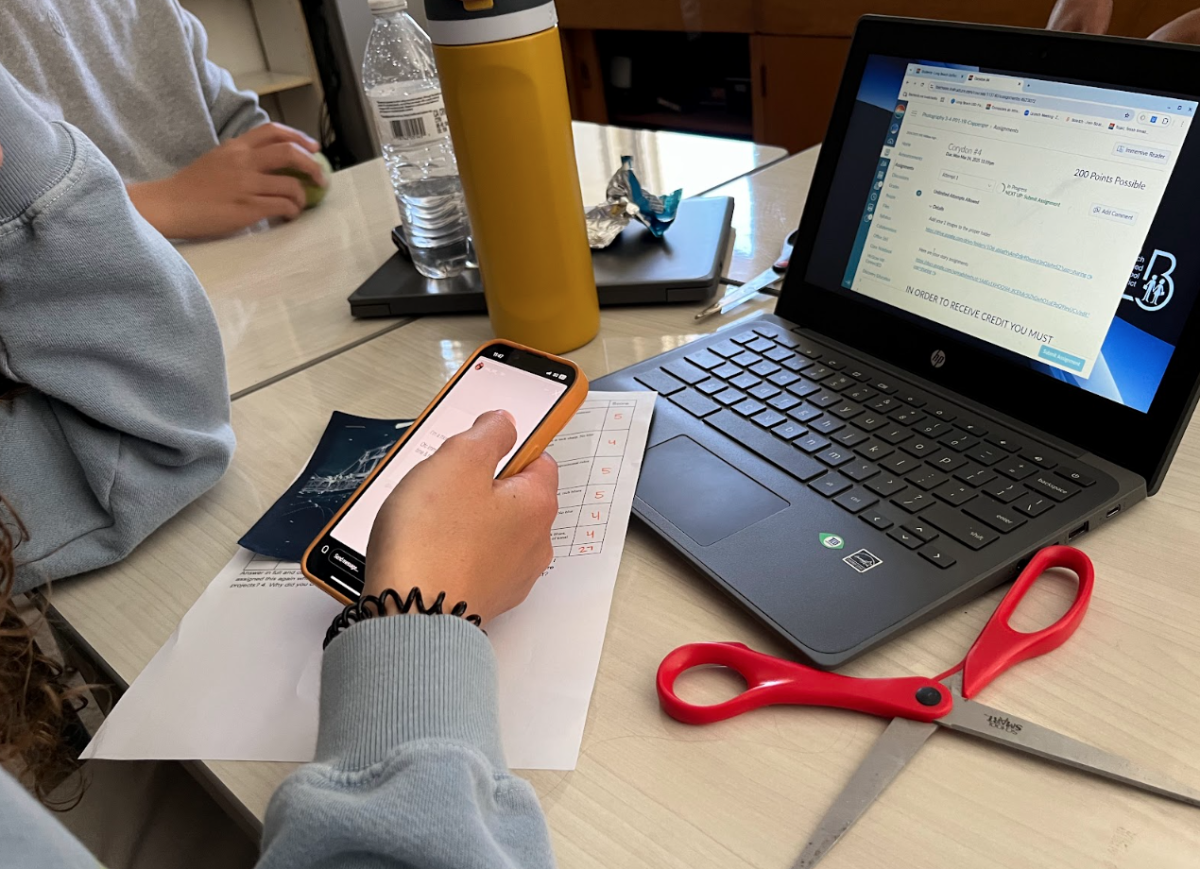

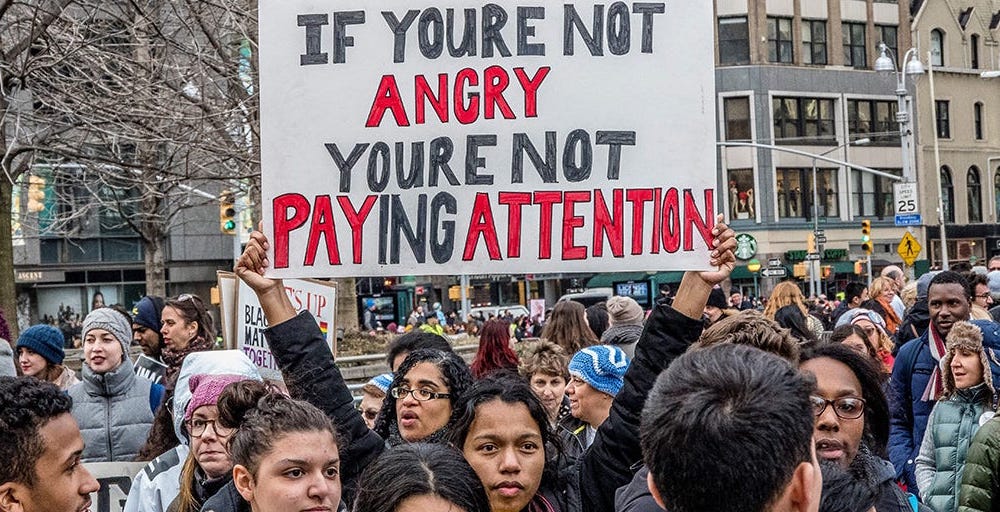




Jeremiah Hunt • Apr 28, 2025 at 3:12 pm
I agree that phone usage in class has become a serious issue. As a student myself, I’ve witnessed firsthand how easily phones can distract both users and those around them. It’s frustrating to see classmates scrolling through social media or watching videos while the teacher is trying to engage us with a lesson. Hollon brings up a strong point about how the COVID-19 pandemic worsened phone addiction. With students having unrestricted access to their phones during remote learning, many developed habits that carried over into in-person school. I believe that implementing a stricter phone policy could help improve focus and classroom participation. That being said, I also think it’s important to find a balance. Phones can be helpful tools when used properly, for research, calculators, or even communication in emergencies. Instead of banning them completely, perhaps we could enforce designated phone-free times during instruction.
Dylan Murray • Apr 22, 2025 at 9:40 am
On April 2, 2025, Liam Hollon composed an article entitled “Phones Need to Leave The Classroom,” which highlights the pervasive distraction of cell phones in Millikan High School classrooms. Hollon’s observation that “at least a quarter of the classroom” is frequently disengaged, scrolling through phones, is deeply concerning. This not only undermines the learning process for those students but also negatively impacts the learning environment for their classmates. The anecdotal evidence provided by Mr. Lopez, a physics teacher, further strengthens this argument in his statement about the increased and almost constant phone use, as it becomes alarming.
Additionally, I would like to add how the article correctly points to the post-COVID period and the resulting worsening of phone addictions as a contributing factor to the current situation. The lack of strict phone policies during remote learning exacerbated this problem, creating a culture where constant phone use is normalized. All in all, I enjoyed this article by Liam Hollon as it shows how schools may succumb to the direct usage of cellphones in classes.
Davis • Apr 21, 2025 at 11:41 pm
I found this article to be an excellent, pertinent, and worthwhile read, especially as an engaged student at Millikan who sees firsthand how the use of phones can take over the learning environment.
I appreciated that the article provided such solid examples and even included a teacher’s perspective, which really illustrated just how bad the issue has become. The quote from Mr. Lopez definitely stood out to me because I myself am a culprit of the phone use epidemic in his classroom.As I read the article, I was sitting there thinking, “Yes, yes, yes” at the mention of students scrolling through their phones instead of listening. I’ve sat in classes where it feels like the lesson is background music to a TikTok scroll. It’s infuriating, especially for students who are trying to stay focused. I think a district policy would be a good idea, especially if it brings consistency to teachers. Although the article wasn’t providing a solution in specific, it did initiate a necessary conversation about how the use of phones needs to be regulated more within school. In general, I think this was a good and much-needed article which shines light on something we’re all coping with every day.
Madeline Palm • Apr 21, 2025 at 4:42 pm
The article describes students’ increased phone usage in school. The article notes that a more strict phone policy could be valuable to our school. I appreciated the connection included in the article about the COVID-19 pandemic and phone usage in classrooms. The article explains how teachers have noticed an increase in phone usage by students after the COVID-19 pandemic. I also liked that the article included a teacher’s perspective on this topic to further demonstrate how many students are distracted by their phones. Although, I do wish that the article included a specific rule that could be implemented into schools to reduce the usage of phones in classrooms to get a clearer idea on how this issue could be resolved. Overall, the article provides an explanation of the recent increase in phone usage over the past few years and demonstrates the need for a more strict phone policy in LBUSD.
Michael Diaz • Apr 21, 2025 at 2:01 pm
Initially, I found the subject of the article very intriguing because I have personal accounts having observed the same issue in classrooms. I am aware of how much of a problem certain students have with restraint regarding cell phone usage during lectures and classwork. This article does a fantastic job providing context for this increase of cell phone usage particularly after the COVID-19 pandemic that plagued the world and schools into virtual classrooms. This type of easy environment and reliance on technology notably lingers into the present. The article is concise and straight to the point, which I enjoy greatly for convenience. One thing I still ponder one was idea that this may not just be a cell phone problem, but a discipline problem in teens, demonstrating the profound negative impact of the pandemic and at-home virtual classrooms that allowed students to get progressively more lazy. Nonetheless, I hope that more students put in more effort into their learning and the restraint from using their phones excessively in class.
Fletcher Rosenberg • Apr 21, 2025 at 1:48 pm
On April 2, 2025, Liam Hollon wrote an article titled “Phones Need to Leave the Classroom.” Hollon’s article effectively argued for a phone policy, consistently stating that there is a large amount of phone use. This use, he argues, contributes to kids missing out on lessons being taught, which could logically lower students’ grades. In addition, Hollon brings up the point that phone use increased following the COVID-19 pandemic.
Although the article does make Hollon’s stance against phones clear, it leaves me wondering what an anti-phone policy would consist of. Hollon states that it would be up to the district, but as a student, I’m much more interested in what a fellow teen would expect from a phone policy. I find myself wondering if other students would advocate for a total ban against phones or would rather be more in support of a more moderate policy.
Alexander Hu • Apr 21, 2025 at 1:42 pm
Dear Corydon Editior,
On April 2, 2025, Liam Hollen shared an article to the Corydon titled “Phones Need To Leave The Classroom”. Not only was the article well written and straightforward, the article did not lack of much information towards the topic. My only concern is how the audience will react towards the article; for instance Liam Hollen mentioned that many are addicted to their phones, then this just means that the change against these students will receive a nasty reaction. I feel like in order to change the social norms including phones you need to make certain ideas that would accommodate phone users. Gather some ideas that you might have and create a poll; this will not only be open to the school and let students vote, but it will also create more awareness of the mess we have started. With all that being said, I believe that you portrayed your article very well and I would like to hear more about your thoughts on this topic; great job.
Nathan A. Dabu • Apr 21, 2025 at 11:35 am
On April 2, 2025, Liam Hollon, an Athletics Reporter part of the Millikan Corydon wrote an article titled “Phones Need To Leave The Classroom”. In this opinion, Hollon addresses the major concern about how there has been a significant increase in cell phone usage in students inside of classrooms. Hollon had expressed that Millikan High should push for a cell phone usage policy, and increase its strictness, as it is said to be “the greatest distraction to all students and greatly reduces the attention span of kids in school”.
In the article, it included a basic example of how, if anyone were to walk into an active classroom period, it would be noticeable that there would be students who are on their phones, not paying attention, and overall missing out on learning. Although this may be a very simple answer, it is true that in some, but not all, classrooms the majority of students are on their phones. However, it is also true that, perhaps, some teachers do not find this to be a concern or issue to act upon. Some teachers might be relaxed about cellphone usage in their classrooms, then on the other hand, there are teachers who are attentive and tell students to put them away. In the future, it would be nice to see more specific examples instead of a generalized perspective on cellphone usage in classrooms, considering the contexts of “What if it had been during a lecture?” or “What assignment had they been working on at the time?”
In the same article, it also had an observation from Millikan’s very own AP Physics teacher, Mr. Lopez, stating that, “People are just glued to their phones, constantly looking down at them all class. I’ve seen more phone use than I’ve seen in my life”. This provides a great view of how one staff member at Millikan has been observing the phone usage behaviours among theirs students, however, like mentioned earlier, it only gives out a generalized and basic perspective of phone usage, and would much be better enhanced to give out more specific examples of correlation between students who use their phones with perhaps grades, missing assignments, or even if they understand certain topics in class.
Overall, this had been a very well-organized opinion, and a very straightforward one to be more specific. It expresses a general and well known concern of cellphone usage among students at Millikan and how the school should tend to this issue. It also should be known or updated that the State of California and Governor Newsom had recently signed for school districts to apply a policy to limit student smartphone usage by July 1st, 2026. And so, LBUSD along with a workgroup, is currently working to form a proposed policy to meet the requirements of the legislation. Very well done job. We look forward to seeing many more examples, improvements, and articles in the future.
Sincerely,
Nathan A. Dabu
Danielle Haskell • Apr 10, 2025 at 9:25 pm
On April 2, 2025, Liam Hollon wrote an article titled “Phones Need To Leave The Classroom”. Hollon provides a brief but concise piece on the impact that phones have on the school setting in the present day; particularly at Millikan. He utilizes a short overall writing in order to encapsulate the importance of phones being removed from Millikan classrooms which was straight and to the point. The seven paragraphs use stylistic choices to create specific points about the introduction of kids and teens’ addiction to their phones and all electronic devices gives the audience context to the issue that is causing critical issues in classes across the country.
I recommend a stronger conclusion even if it is only a sentence or two more after proposing the solution with LBUSD in order to wrap up the article to bring it back to the severe damage that the addiction to phones are doing to the learning environment and the way that students’ are retaining information or lack thereof.
Addie Melena • Apr 10, 2025 at 9:20 pm
Dear Corydon Editor,
On April 2, 2025, Liam Hollon wrote an article titled “Phones Need To Leave The Classroom.” This article expresses concerns over excessive phone use shown in students at Millikan and calls for a strict phone policy to be enacted immediately. Hollon provides evidence from the narrative of physics teacher, Mr. Lopez, who stated that “people are just glued to their phones constantly looking down at them all class.” By providing this quote, Hollon is illustrating the effect phone use has not only on students who are missing out on lessons, but also the teachers who face the consequences of students getting behind.
After reading this article, it made me reflect on the fact that I am also on my phone during class and it is something I need to work on. Overall, Liam Hollon’s article was straight to the point and I like that he also provided pictures showcasing students on their phones to capture the issue at hand. While I also agree that action must be taken by the district, Millikan teachers can also implement their own policies.
Eliana Brion • Apr 10, 2025 at 1:51 pm
Dear Corydon Editor,
On April 2, 2025, Liam Hollon wrote an article titled “Phones Need To Leave The Classroom”. Hollon argues that the Long Beach Unified School District should immediately implement regulations limiting the use of cellular phones in classrooms. Moreover, Hollon describes the distracted and disengaged students in each class of the Millikan campus which is detrimental to their learning abilities. The author quotes physics teacher Mr. Lopez, “‘People are just glued to their phones, constantly looking down at them all class. I’ve seen more phone use than I’ve seen in my life.’” Hollon supports the fact that the COVID-19 pandemic allowed for an increase in phone addictions due to the lack of mobile regulation during that time. Ultimately, Hollon claims that a phone policy should be strictly applied to students in order to benefit their learning capabilities.
In my opinion, I completely agree with Hollon that there is a significant issue in phone addictions, especially during school hours. I too am guilty of using my phone during class, which I can assure is a major distraction and sometimes can cause me to miss an important lesson. As a student, it would be a disappointment to me if there was cellular regulation, only because admittedly I like to use my phone a lot. However, I believe that if there was a phone policy implemented, I think that students would be able to focus more and therefore benefit their grades.
This article effectively convinces me that there should be a limit on cell phone usage during school hours so that students can overcome their phone addictions, and in return improve their academic performance.
Sincerely,
Eliana Brion
Charlotte Fields • Apr 9, 2025 at 5:38 pm
This article elaborates on the concerning and significant overuse of phones in school settings. He implements straightforward and clear statements of his personal opinion, with reliable quotes as evidence. He also makes clear that the issue is present in all schools to show readers that a resolution that covers the whole district would be more impactful than only having a change at Millikan. His article is brief, yet makes clear of a few considerations and subtopics that should be expanded, including plan options that can be used to reduce phone usage.
A topic I believe the author should definitely consider if they decide to write more on the topic is the consequences of implementing strict phone policy. A primary negative would definitely be backlash from parents, in a concern for safety. Various parents make the argument that phones should not be taken away in the case of a desperate need to contact their children during emergencies. Additionally, the process of getting students on board with the plan would be difficult, especially considering the behaviors of certain students.